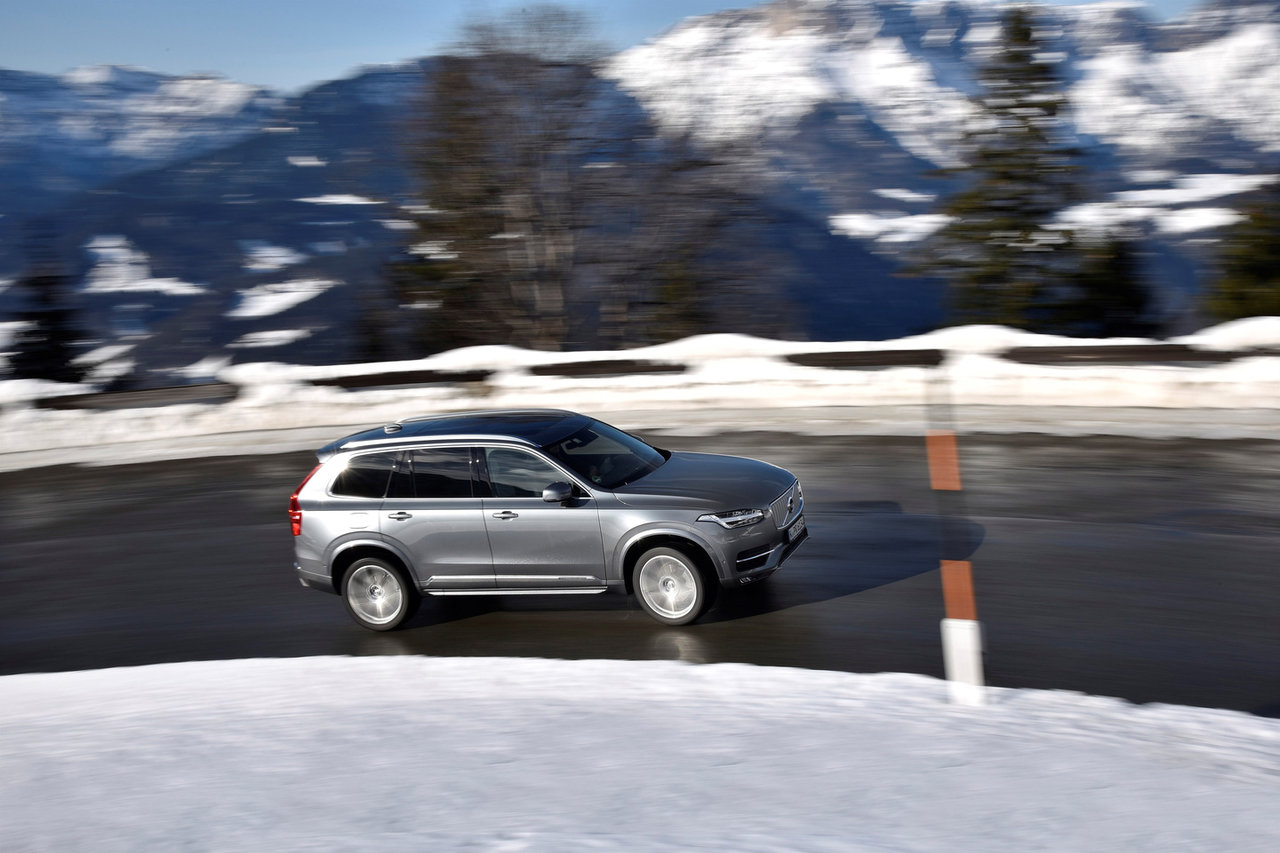
How Volvo's Advanced Air Quality System Works in Your XC60, XC90, or Electric SUV
Volvo's Advanced Air Quality System includes a PM 2.5 particle filter that prevents up to 95 percent of hazardous airborne particles from entering...
Read moreVolvo Cars Mississauga

Most Mississauga drivers understand winter tires improve cold-weather safety and performance. The practical questions emerge after making the installation decision: when should installation occur given GTA weather patterns, what wheel configuration makes economic sense, and how can professional service ensure proper installation and storage?
These considerations determine whether winter tire ownership remains manageable or becomes burdensome. This examination addresses the implementation details specific to Mississauga residents, from optimal timing based on local temperature patterns through professional storage solutions that eliminate home storage challenges.
Installation Timing for GTA Climate Patterns
Unlike regions with predictable winter onset, the Greater Toronto Area experiences variable autumn temperature patterns. Some years bring early November cold snaps, while others maintain mild conditions into December. Calendar-based installation dates prove unreliable for this climate variability.
The critical threshold sits at 7°C—the temperature where all-season tire rubber compounds begin losing flexibility while winter tire compounds maintain performance. For Mississauga specifically, monitoring overnight low temperatures provides the most reliable installation signal. When overnight lows consistently fall to 5-7°C and daytime highs remain below 12°C for approximately one week, conditions favour winter tire installation.
Historical weather data for Mississauga shows this temperature pattern typically establishes between November 15 and December 5. However, annual variation spans roughly three weeks, making flexible scheduling more practical than fixed annual appointments.
Installing winter tires while temperatures remain warm accelerates tread wear. Winter tire rubber compounds are formulated to remain flexible in extreme cold, which makes them relatively soft. Operating on warm, dry pavement at temperatures above 10°C causes faster wear than operation in cold conditions. A week of premature installation might reduce total tire lifespan by 500-1,000 km of usable tread.
Conversely, delaying installation past optimal timing creates safety risks when unexpected snow or ice arrives. Mississauga's position near Lake Ontario can produce sudden weather changes, with freezing rain or snow squalls arriving rapidly when weather systems interact with lake moisture. Most drivers find installing slightly early provides better risk management than waiting for the first snowfall, which often coincides with installation appointment backlogs at service centres.
Our service advisors at Volvo Cars Mississauga monitor local weather patterns and can recommend optimal installation timing based on current forecasts and your driving patterns.
Professional Installation: Dedicated Wheels vs. Tire-Only Swaps
Winter tire installation requires choosing between mounting winter tires on dedicated wheels or swapping tires on existing wheels seasonally. This decision significantly impacts both initial costs and ongoing convenience, and our service team can help you evaluate which approach suits your situation.
Tire-Only Installation
Installing winter tires directly onto the vehicle's existing wheels requires dismounting all-season tires, mounting winter tires, and balancing each wheel assembly. This process repeats twice annually—once in autumn for winter tire installation, once in spring for all-season tire reinstallation.
This approach requires lower initial investment since you only purchase four tires. However, it results in higher labour costs each season for mounting, dismounting, and balancing. The service appointment typically takes 2-3 hours, and repeated mounting cycles increase tire bead wear over time.
The initial cost includes four winter tires ($800-1,400 depending on size and model), with seasonal swap costs of $100-150 per change for mounting, balancing, and installation. Annual cost runs $200-300 for two seasonal changes.
Dedicated Winter Wheel Package
Purchasing four additional wheels specifically for winter tires allows seasonal changes through simple wheel swaps. The winter tire remains mounted on its dedicated wheel year-round, with seasonal changes involving only removing one set of wheels and installing the other.
This approach protects your primary wheels from winter salt and road chemicals while enabling faster service appointments of typically 30-45 minutes. There's no tire bead wear from repeated mounting, and the process proves more efficient for both you and our service technicians.
The initial investment includes four winter tires, four steel or alloy wheels, and TPMS sensors. seasonal swap costs drop to $50-80 per change for wheel removal and installation, with annual costs of only $100-160 for two seasonal changes.
Our service team at Volvo Cars Mississauga can walk you through both options and help you calculate the break-even point based on your expected ownership timeline. For most drivers keeping their Volvo for three or more years, the dedicated wheel package saves money while providing greater convenience.
TPMS Sensor Requirements for Volvo Models
All modern Volvo models include Tire Pressure Monitoring Systems that alert drivers when tire pressure falls below safe levels. When installing winter tires on dedicated wheels, TPMS sensors must be installed in the winter wheel set to maintain this critical safety feature.
Without sensors, the vehicle displays persistent warning messages indicating TPMS system malfunction. While the vehicle remains drivable with TPMS warnings active, the constant dashboard alert creates distraction and prevents monitoring actual tire pressure issues should they occur during winter driving.
Our service department stocks both OEM Volvo sensors ($75-100 per sensor) and quality aftermarket universal sensors ($40-60 per sensor). We typically recommend OEM sensors for guaranteed compatibility and warranty coverage. The TPMS sensors require programming to communicate with your specific vehicle, which our technicians handle during installation with no additional labour cost.
Professional Tire Storage Solutions
Storing eight wheels and tires (four mounted on vehicle, four in storage) challenges residents without garage space. This proves particularly common for Mississauga drivers in condominiums or townhouses.
Our seasonal tire storage service eliminates home storage needs entirely. For $60-120 per season, we store your off-season tires in our climate-controlled facility, protecting them from UV exposure, moisture, and temperature extremes that can degrade rubber compounds.
The service includes seasonal swap labour, meaning you simply schedule your appointment and we handle the complete transition. Your removed tires go directly into proper storage, and when the next season arrives, we retrieve them for installation. This comprehensive approach eliminates the need to transport tires, find storage space, or worry about proper storage conditions.
For drivers who prefer home storage, we offer tire storage bags ($30-60 for a four-bag set) that protect against UV exposure and moisture. Our service advisors can also provide guidance on proper storage positioning and rotation strategies to maximize tire lifespan.
Long-Term Value
Winter tires typically last 40,000-60,000 km of winter driving. For average drivers covering approximately 8,000 km during winter months, this translates to 5-7 winter seasons before tire replacement becomes necessary. When replacement occurs, you only purchase new tires since existing wheels, TPMS sensors, and storage arrangements continue serving indefinitely.
Our service team at Volvo Cars Mississauga can help you calculate total cost of ownership based on your specific driving patterns and storage preferences.
Why Professional Installation Matters
Winter tire installation involves more than simply mounting tires to wheels. Proper installation requires correct torque specifications, TPMS programming verification, and pressure adjustment for seasonal temperatures. Our factory-trained technicians understand Volvo-specific requirements and ensure your winter tire setup maintains all safety systems and warranty compliance.
Professional installation also includes inspection of brake components, suspension elements, and tire condition. This seasonal inspection often identifies developing issues before they become serious problems, potentially preventing costly repairs and maintaining your Volvo's reliability through harsh winter conditions.
When you choose professional installation at our service department, you benefit from proper equipment, technical expertise, and warranty protection. Our service records document all work, maintaining comprehensive maintenance history that supports resale value.
Scheduling Your Winter Tire Service
Service centre capacity becomes constrained during peak installation periods in early November, mid-to-late November, and during the first snowfall event. Scheduling appointments 2-3 weeks in advance during October avoids peak-period waits and ensures you're prepared before severe weather arrives.
We offer convenient online appointment booking and can accommodate various scheduling needs. Our service advisors will confirm whether you need a 30-45 minute wheel swap appointment or a 2-3 hour tire mounting appointment based on your setup.
For drivers with dedicated wheel packages stored at home, we can often accommodate quick same-day service during off-peak periods. However, advance scheduling ensures we have appropriate time allocated for your service needs.
Seasonal Swap Best Practices
Maximizing winter tire investment requires proper seasonal transition procedures. When you bring your Volvo to our service department for seasonal swaps, our technicians follow comprehensive procedures that extend tire life and maintain safety systems.
We inspect tire condition before installation, verifying minimum tread depth of 5mm and checking for damage or irregular wear. After installation, we adjust tire pressure for seasonal temperatures and verify TPMS function to ensure all warning systems operate correctly.
Before storing removed tires, we clean them to remove salt and debris that could cause degradation during storage. We also mark tire positions to enable proper rotation during the next installation, equalizing wear patterns and maximizing total lifespan.
For drivers using our storage service, this complete process happens automatically at each seasonal transition. For those storing tires at home, our service advisors can provide guidance on proper storage procedures and rotation strategies.
Experience Complete Winter Tire Service at Volvo Cars Mississauga
Professional winter tire service protects your investment while ensuring optimal performance and safety. Our service department provides comprehensive winter tire solutions including installation, TPMS programming, seasonal storage, and expert guidance tailored to Mississauga driving conditions.
Schedule your winter tire consultation or installation appointment at Volvo Cars Mississauga. Our service advisors will help you select appropriate tires, determine optimal wheel configuration, and establish convenient seasonal service routines. Visit us in Mississauga to experience service that makes winter tire ownership straightforward and manageable.

How Volvo's Advanced Air Quality System Works in Your XC60, XC90, or Electric SUV
Volvo's Advanced Air Quality System includes a PM 2.5 particle filter that prevents up to 95 percent of hazardous airborne particles from entering...
Read more
What Mississauga Drivers Should Know About Charging an Electric Volvo in Ontario
Electric vehicle ownership requires understanding charging infrastructure, home electrical requirements, and trip planning approaches that differ...
Read more
2026 Volvo EX30 Cross Country: Rugged Electric Style for Ontario Adventure Seekers
The Volvo EX30 Cross Country brings adventure-ready capability to Volvo's compact electric SUV, adding raised ground clearance, protective skid...
Read more